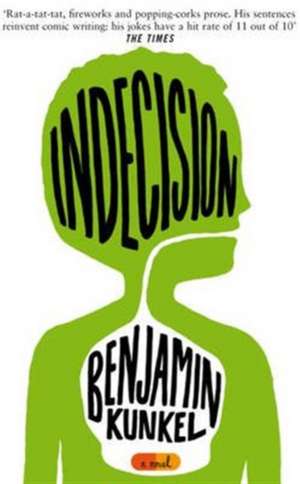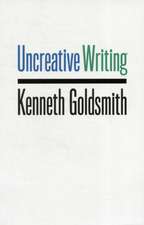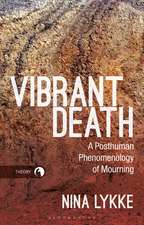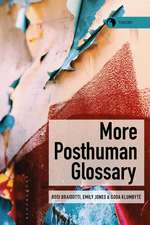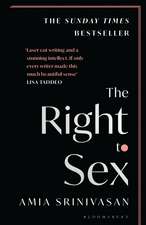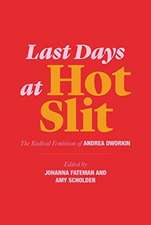Indecision
Autor Benjamin Kunkelen Limba Engleză Paperback – 22 mai 2013
| Toate formatele și edițiile | Preț | Express |
|---|---|---|
| Paperback (2) | 57.59 lei 6-8 săpt. | |
| PICADOR – 22 mai 2013 | 57.59 lei 6-8 săpt. | |
| Random House Trade – 31 mar 2006 | 107.43 lei 6-8 săpt. |
Preț: 57.59 lei
Preț vechi: 66.03 lei
-13% Nou
Puncte Express: 86
Preț estimativ în valută:
11.02€ • 11.48$ • 9.08£
11.02€ • 11.48$ • 9.08£
Carte tipărită la comandă
Livrare economică 31 ianuarie-14 februarie 25
Preluare comenzi: 021 569.72.76
Specificații
ISBN-13: 9781447241638
ISBN-10: 1447241630
Pagini: 258
Dimensiuni: 156 x 234 x 16 mm
Greutate: 0.45 kg
Editura: PICADOR
ISBN-10: 1447241630
Pagini: 258
Dimensiuni: 156 x 234 x 16 mm
Greutate: 0.45 kg
Editura: PICADOR
Notă biografică
Benjamin Kunkel grew up in Colorado. He has written for Dissent, The Nation, and the The New York Review of Books, and is a founding editor of n+1 magazine.
From the Hardcover edition.
From the Hardcover edition.
Extras
ONE
A week before Quito I was sitting up in bed in New York, the edges of my awareness lapped at by traffic. I was sitting there with one hand holding open the book I was reading, and the other hand placed above the head of sleeping Vaneetha. There I was, pinned in space and time like a specimen in a box.
Vaneetha had turned away and slid down the bed so that nothing of her was visible except for the dark disheveled Vaneethian hair from which the lamplight was extracting all these twisting strings of a greenish iridescence. I wouldn’t have figured that even the darkest hair could react to light in this way, and the discovery blinked in my mind as just the smallest, quietest symbol of the multiple discoveries that could still be made between us if we–unless it was mostly me–weren’t so ambivalent about making them.
Once a week had become more like two times, and on our nights together I was usually awake like this for an hour or so while Vaneetha slept and breathed beside me. Sometimes she’d twitch like a dreaming dog, and in part due to my intense feeling for dogs, shared by my entire family, this would induce a shiver of tenderness in me. Yet exactly because I experienced this tenderness I wondered if I shouldn’t stop showing it when we were both awake. It could lead to us feeling, harmfully, that we were together. And as our relationship was predicated on not wanting to be in a relationship yet, that seemed unlike the best idea. We were both in agreement that contemporary courtship was far too accelerated these days. That was how Vaneetha explained why she’d had so few partners, and how I explained why I’d had seventeen or more. Nevertheless it eventually became up-in-the-air and unspoken whether we were sleeping together brother-sister style and mostly refraining from outright sex except when drunk because a) we weren’t courting each other or
b) we were, only slowly, just as these things should be done and never are.
In any case it often seemed at night that I would make a better dog owner than boyfriend. It wasn’t apparent to me how best to treat Vaneetha, each woman being so different. Whereas every dog, in spite of the really incredible variety of the species, required more or less the same regimen of food and water, walks and affectionate pats on the head. However in the city it actually exacted a lot less responsibility to have a girlfriend than a dog. And I really wanted one or the other, since like any person, or dog, I too craved affection. Hmn.
It was almost a type of peace to arrive each night at the same mental impasse. Plus I felt at home in the quiet, like a local. I was sensitive and weirdly sympathetic to that moment when the refrigerator kicked in and began to hum. Then the groans of a garbage truck would as much confirm as interrupt the hush. And there was the bonus sensation of authority I got as the last one up, the presiding mind.
So I would return to certain issues like hands to a notch on the clock. It would always dawn on me, late at night, that life is made of days–and your life isn’t likely to pick up whatever your days pass by. Granted, this was really a postmortem analysis of the given day, carried out when it was already yesterday or tomorrow, depending on point of view. If it was one of the nights that Ford (roommate one) and his girlfriend Kat were spending downtown with us, they would have finished giving one another the business to the accompaniment of frightened bedsprings.
And if it was past two then Sanchez (roommate two) would have gotten up out of his humid sleep to shut off the TV he’d equipped with a hot cable box transmitting pirated pay-per-view sporting events, feature films, and porn in an endless jostling stream. And Dan (roommate three) might or might not be around, since more and more he moved very quietly through the world, subsisting on snacks and growing thin and spiritual and haunted-looking, and only occasionally briefing us between classes and lab at NYU med school on what he was learning there. Lately he’d expressed the opinion that general uremia must be the least painful way to go in the end, and had assured me and Sanch that there was little to no scientific evidence linking coffee, even my six cups daily, with cancer.
Sanch said, “Yeah man fucking Hugo Chávez drinks sixteen espressos a day. And that’s after his staff weaned him down from twenty-four.”
“Amazing!” I was really impressed with this man. “Who is Hugo Chávez?”
“He’s, like, a revolutionary.”
“Sounds like it,” I said.
Sometimes Dan could be found in his room poring over a textbook while listening through his headphones to terrifying music by Austro-Hungarian composers. But his whereabouts were erratic, or I couldn’t do the algorithm, and anyway he stayed with us only due to low rent. It wouldn’t have been so low if the walls to our rooms had gone all the way up to the ceiling. Instead we lived in pasteboard cubicles and weird dorm-style intimacy–which kind of enforced an obscurish connection between my home life and my days at Pfizer, where the cubicle was also the unit.
Anyway Ford, Sanch, Dan, me–that was Chambers St., and was going to be for five more weeks, until our lease ran out. Other friends lived scattered around the city in ones and twos, and this had allowed us four to provide, in the welcoming squalor of our living room, a kind of community center for the school-days diasporae. Poker was played, friends were entertained, TV got watched and color-commentated. Out of everybody we knew our immaturity was best-preserved, we dressed worst and succeeded least professionally–and at times I could get into feeling that for the old crowd to set foot on the scarred linoleum of our kitchen must be like entering this circling, slow eddy in the otherwise one-way flow of time. Outside was the streaming traffic, the money bazaar, the trash-distributing winds with their careerist velocities. And here inside Chambers St. was this cozy set of underachievers. We even had a fireplace, though it didn’t work, and housed the stereo instead. At times I gained control of the remote, and the drowned-sounding post-human electronica that was our usual aural wallpaper, making me feel like words might not apply to our condition, and freaking me out if I got stoned, was replaced by the bright fine stylings of the Grateful Dead, just as if Jerry’d never died.
But Jerry had died. And soon our lease would be up! And so would I end and die too! I tried not to be reminded of the eternal endingness of everything by Ground Zero down the street. I really preferred for the reminder to come, more gently, from philosopher Otto Knittel. In the months before Ecuador I was all about The Uses of Freedom–or Der Gebrauch der Freiheit if you’re German. Late at night I would look at the words of this very deathocentric book, and on that Saturday night with Vaneetha (which had so far failed to distinguish itself from many of the Saturday nights preceding it) I was looking again at the words, with one eye open and the other shut since I’d taken out my contacts and otherwise couldn’t focus on the lines. “Procrastination is our substitute for immortality,” went the first half of the sentence I was rereading; “we behave as if we have no shortage of time.” I read the book at maybe two pages an hour.
Yet I felt more slow than stupid, and suspected it had always been thus with me. Maybe my slow temporal metabolism wasn’t equipped for the efficient digestion of modern–or postmodern–life, as it had apparently already been for some time. Sometimes I felt like I’d never catch up with even the little that had happened to me. There had already been too many people and places, and the creaking stagecoach journey or straggling canoe ride by which one location might observe, in olden times, how it became the next (and one Dwight, the next, uncannily similar Dwight) had been supplanted by the sleight of hand of subways and airplanes, always popping you out in unexpected places.
At least at night the phone didn’t ring. My feeling was, the soul is startled by the telephone and never at ease in its presence. Often on a midtown street someone’s cell would ring and half a dozen people would check their pockets to see if it was them being called, and I’d glimpse a flash of panic in one or another guy’s eyes. Myself, I kind of felt like I needed my news delivered by hand–to look out the window as some courier appeared in the field, coming from a distance so my feelings had time to discover themselves. But instead people were always calling and asking me to do things, and since only pretty rarely was I really sure I wanted to, my system was to flip a coin. “Hold on let me check my . . . yeah sounds cool but hold on . . .” I would say in the Chambers St. kitchen or if someone called at work. But I didn’t have a date book and was actually consulting one of the special coins. Heads, I’d accept–whereas tails, I’d claim to have other plans. I was proud of this system. Statistically fair, it also kept my whole easy nature from forcing me to do everyone’s bidding; it ensured a certain scarcity of Dwightness on the market; it contributed the prestige of the inscrutable to my otherwise transparent persona; and above all it allowed me to find out in my own good time whether I would actually have liked to do the thing in question. By then it was invariably too late–but everyone agrees that knowledge is its own reward, and so do I.
A night alone meant I could get a jump on The Uses of Freedom. At this rate there was every possibility of my finishing inside of the year. “Why don’t you just write the thing,” Dan said. “It would probably be faster.”
“But how would I ever come up with Der Unternehmungsgrund der Individuums on my own?”
When I first read about this ground for the individual’s action, I could at last put an unwieldy and foreign name to what I had felt had been missing from my life ever since puberty struck and my prep-school days commenced, more or less at once, and I’d begun to proceed unsteadily from day to day as if I were on a bridge swaying in the wind while both sides of the canyon–I mean past and future–disappeared in foggy weather. Suddenly I’d lost the sensation of there being either a source or an end to my life, an original birth or ultimate death, and was therefore amazed at how everyone seemed to consider me a solid reliable young man. Otto Knittel, I was learning as a much older young man, was way into forests, so while reading him I would imagine decamping from the city and going to live in the woods in Vermont. With a dog. Or several dogs. The idea was to inhabit a cabin, baking bread and hardly even watching TV, petting and talking to the dog, or dogs, and drinking tea instead of so much coffee. Sunlight, wide floorboards, caller ID for the phone . . . And old friends from the city could drive up to admire my aura of wisdom and calm benevolence that I would be too egoless even to notice. I felt that in these circumstances the ground for my actions might sort of percolate up through me in this slow molten way, and a prayerful clarity of consciousness would finally pop into my brain. Then I would know what to do. Then I could return to New York, and do it.
But in the smaller of the hours I could get to feeling bad that I hadn’t even looked into doing “it” yet. And the feeling was worse if the night ended with the warm smooth length of Vaneetha at my side, as she slept and breathed beneath my not-so-clean cotton sheets. There were starting to be signs that a serious attachment to me had been formed, by her, so that not only would I need to slip out of the city to go let my truer understandings avail themselves of me–I’d also have to extricate myself from someone else’s life.
One good thing was that at least I didn’t have a lot of furniture to take. However first I would need to find a town in Vermont, and a job there. Yet I was full of hope that the new information-based economy might really spell the end of geography and I could do tech support from the woods. Then again this hopefulness was so 1999, and now it was May 2002–late May already. In any case I had a to-do list (more a list of good intentions) and before finally going to sleep I would get up to write down–after GROCERIES! or MOM RE: CHURCH!! or VANEETHA? or PAPER TOWELS or COST OF SHRINKS?–LOOK INTO VT. OPTIONS.
So it would be late at night before I fell asleep. But don’t worry: I got plenty of sleep. Not only was I an excellent sleeper, but I had no functioning alarm clock to disrupt my Cimmerian rhythms. Of course when the relevant button broke off, I’d put it on my list to get another clock. But then at work they–or Rick, the manager–made an announcement, which was that although we who worked at Pfizer in the Problem Resolution Center were already only subcontracted, we were still considered in house for the fairly inarguable reason that our office was housed in Pfizer headquarters. Soon some guys in Mumbai, India, were going to be doing our work for less of our pay. “You sayin we getting outsourced here?” my colleague Wanda asked. Rick was saying that, and adding this sick little smile all his own.
The effect on morale was not good. In my case I saw that globalization was for real and declined to replace my alarm clock. What did I have to get up for if my days at Pfizer were numbered anyway? Now I usually just woke around ten, yawning and stretching, replenished with ignorance. Work was officially beginning but I would go out and get an everything bagel–impossible, otherwise, to choose–and come back and toast the halves and slather one with pesto and the other with Nutella. Yum.
So far my main accommodation to Vaneetha-Dwight domesticity was to keep little jars of both condiments at her place in Carroll Gardens. “I still can’t believe what you’ll put in your mouth.” Her dad’s various ambassadorial postings had caused her to be educated in British-run schools, and she pronounced can’t like as in philosopher Immanuel Kant. “But I’m touched you’re moving in, after your fashion.” Morningtime fun could be had if she was game and would feed me a mystery bagel half while my eyes were closed. “To have no idea,” I would say, “when both options are so equally good!”
Then I rode the F train, if from Vaneetha’s place, or took the
2/3 to Forty-second, and on the way would look at The Uses of
Freedom–such a different book in the daylight, and so much less credible.
From the Hardcover edition.
A week before Quito I was sitting up in bed in New York, the edges of my awareness lapped at by traffic. I was sitting there with one hand holding open the book I was reading, and the other hand placed above the head of sleeping Vaneetha. There I was, pinned in space and time like a specimen in a box.
Vaneetha had turned away and slid down the bed so that nothing of her was visible except for the dark disheveled Vaneethian hair from which the lamplight was extracting all these twisting strings of a greenish iridescence. I wouldn’t have figured that even the darkest hair could react to light in this way, and the discovery blinked in my mind as just the smallest, quietest symbol of the multiple discoveries that could still be made between us if we–unless it was mostly me–weren’t so ambivalent about making them.
Once a week had become more like two times, and on our nights together I was usually awake like this for an hour or so while Vaneetha slept and breathed beside me. Sometimes she’d twitch like a dreaming dog, and in part due to my intense feeling for dogs, shared by my entire family, this would induce a shiver of tenderness in me. Yet exactly because I experienced this tenderness I wondered if I shouldn’t stop showing it when we were both awake. It could lead to us feeling, harmfully, that we were together. And as our relationship was predicated on not wanting to be in a relationship yet, that seemed unlike the best idea. We were both in agreement that contemporary courtship was far too accelerated these days. That was how Vaneetha explained why she’d had so few partners, and how I explained why I’d had seventeen or more. Nevertheless it eventually became up-in-the-air and unspoken whether we were sleeping together brother-sister style and mostly refraining from outright sex except when drunk because a) we weren’t courting each other or
b) we were, only slowly, just as these things should be done and never are.
In any case it often seemed at night that I would make a better dog owner than boyfriend. It wasn’t apparent to me how best to treat Vaneetha, each woman being so different. Whereas every dog, in spite of the really incredible variety of the species, required more or less the same regimen of food and water, walks and affectionate pats on the head. However in the city it actually exacted a lot less responsibility to have a girlfriend than a dog. And I really wanted one or the other, since like any person, or dog, I too craved affection. Hmn.
It was almost a type of peace to arrive each night at the same mental impasse. Plus I felt at home in the quiet, like a local. I was sensitive and weirdly sympathetic to that moment when the refrigerator kicked in and began to hum. Then the groans of a garbage truck would as much confirm as interrupt the hush. And there was the bonus sensation of authority I got as the last one up, the presiding mind.
So I would return to certain issues like hands to a notch on the clock. It would always dawn on me, late at night, that life is made of days–and your life isn’t likely to pick up whatever your days pass by. Granted, this was really a postmortem analysis of the given day, carried out when it was already yesterday or tomorrow, depending on point of view. If it was one of the nights that Ford (roommate one) and his girlfriend Kat were spending downtown with us, they would have finished giving one another the business to the accompaniment of frightened bedsprings.
And if it was past two then Sanchez (roommate two) would have gotten up out of his humid sleep to shut off the TV he’d equipped with a hot cable box transmitting pirated pay-per-view sporting events, feature films, and porn in an endless jostling stream. And Dan (roommate three) might or might not be around, since more and more he moved very quietly through the world, subsisting on snacks and growing thin and spiritual and haunted-looking, and only occasionally briefing us between classes and lab at NYU med school on what he was learning there. Lately he’d expressed the opinion that general uremia must be the least painful way to go in the end, and had assured me and Sanch that there was little to no scientific evidence linking coffee, even my six cups daily, with cancer.
Sanch said, “Yeah man fucking Hugo Chávez drinks sixteen espressos a day. And that’s after his staff weaned him down from twenty-four.”
“Amazing!” I was really impressed with this man. “Who is Hugo Chávez?”
“He’s, like, a revolutionary.”
“Sounds like it,” I said.
Sometimes Dan could be found in his room poring over a textbook while listening through his headphones to terrifying music by Austro-Hungarian composers. But his whereabouts were erratic, or I couldn’t do the algorithm, and anyway he stayed with us only due to low rent. It wouldn’t have been so low if the walls to our rooms had gone all the way up to the ceiling. Instead we lived in pasteboard cubicles and weird dorm-style intimacy–which kind of enforced an obscurish connection between my home life and my days at Pfizer, where the cubicle was also the unit.
Anyway Ford, Sanch, Dan, me–that was Chambers St., and was going to be for five more weeks, until our lease ran out. Other friends lived scattered around the city in ones and twos, and this had allowed us four to provide, in the welcoming squalor of our living room, a kind of community center for the school-days diasporae. Poker was played, friends were entertained, TV got watched and color-commentated. Out of everybody we knew our immaturity was best-preserved, we dressed worst and succeeded least professionally–and at times I could get into feeling that for the old crowd to set foot on the scarred linoleum of our kitchen must be like entering this circling, slow eddy in the otherwise one-way flow of time. Outside was the streaming traffic, the money bazaar, the trash-distributing winds with their careerist velocities. And here inside Chambers St. was this cozy set of underachievers. We even had a fireplace, though it didn’t work, and housed the stereo instead. At times I gained control of the remote, and the drowned-sounding post-human electronica that was our usual aural wallpaper, making me feel like words might not apply to our condition, and freaking me out if I got stoned, was replaced by the bright fine stylings of the Grateful Dead, just as if Jerry’d never died.
But Jerry had died. And soon our lease would be up! And so would I end and die too! I tried not to be reminded of the eternal endingness of everything by Ground Zero down the street. I really preferred for the reminder to come, more gently, from philosopher Otto Knittel. In the months before Ecuador I was all about The Uses of Freedom–or Der Gebrauch der Freiheit if you’re German. Late at night I would look at the words of this very deathocentric book, and on that Saturday night with Vaneetha (which had so far failed to distinguish itself from many of the Saturday nights preceding it) I was looking again at the words, with one eye open and the other shut since I’d taken out my contacts and otherwise couldn’t focus on the lines. “Procrastination is our substitute for immortality,” went the first half of the sentence I was rereading; “we behave as if we have no shortage of time.” I read the book at maybe two pages an hour.
Yet I felt more slow than stupid, and suspected it had always been thus with me. Maybe my slow temporal metabolism wasn’t equipped for the efficient digestion of modern–or postmodern–life, as it had apparently already been for some time. Sometimes I felt like I’d never catch up with even the little that had happened to me. There had already been too many people and places, and the creaking stagecoach journey or straggling canoe ride by which one location might observe, in olden times, how it became the next (and one Dwight, the next, uncannily similar Dwight) had been supplanted by the sleight of hand of subways and airplanes, always popping you out in unexpected places.
At least at night the phone didn’t ring. My feeling was, the soul is startled by the telephone and never at ease in its presence. Often on a midtown street someone’s cell would ring and half a dozen people would check their pockets to see if it was them being called, and I’d glimpse a flash of panic in one or another guy’s eyes. Myself, I kind of felt like I needed my news delivered by hand–to look out the window as some courier appeared in the field, coming from a distance so my feelings had time to discover themselves. But instead people were always calling and asking me to do things, and since only pretty rarely was I really sure I wanted to, my system was to flip a coin. “Hold on let me check my . . . yeah sounds cool but hold on . . .” I would say in the Chambers St. kitchen or if someone called at work. But I didn’t have a date book and was actually consulting one of the special coins. Heads, I’d accept–whereas tails, I’d claim to have other plans. I was proud of this system. Statistically fair, it also kept my whole easy nature from forcing me to do everyone’s bidding; it ensured a certain scarcity of Dwightness on the market; it contributed the prestige of the inscrutable to my otherwise transparent persona; and above all it allowed me to find out in my own good time whether I would actually have liked to do the thing in question. By then it was invariably too late–but everyone agrees that knowledge is its own reward, and so do I.
A night alone meant I could get a jump on The Uses of Freedom. At this rate there was every possibility of my finishing inside of the year. “Why don’t you just write the thing,” Dan said. “It would probably be faster.”
“But how would I ever come up with Der Unternehmungsgrund der Individuums on my own?”
When I first read about this ground for the individual’s action, I could at last put an unwieldy and foreign name to what I had felt had been missing from my life ever since puberty struck and my prep-school days commenced, more or less at once, and I’d begun to proceed unsteadily from day to day as if I were on a bridge swaying in the wind while both sides of the canyon–I mean past and future–disappeared in foggy weather. Suddenly I’d lost the sensation of there being either a source or an end to my life, an original birth or ultimate death, and was therefore amazed at how everyone seemed to consider me a solid reliable young man. Otto Knittel, I was learning as a much older young man, was way into forests, so while reading him I would imagine decamping from the city and going to live in the woods in Vermont. With a dog. Or several dogs. The idea was to inhabit a cabin, baking bread and hardly even watching TV, petting and talking to the dog, or dogs, and drinking tea instead of so much coffee. Sunlight, wide floorboards, caller ID for the phone . . . And old friends from the city could drive up to admire my aura of wisdom and calm benevolence that I would be too egoless even to notice. I felt that in these circumstances the ground for my actions might sort of percolate up through me in this slow molten way, and a prayerful clarity of consciousness would finally pop into my brain. Then I would know what to do. Then I could return to New York, and do it.
But in the smaller of the hours I could get to feeling bad that I hadn’t even looked into doing “it” yet. And the feeling was worse if the night ended with the warm smooth length of Vaneetha at my side, as she slept and breathed beneath my not-so-clean cotton sheets. There were starting to be signs that a serious attachment to me had been formed, by her, so that not only would I need to slip out of the city to go let my truer understandings avail themselves of me–I’d also have to extricate myself from someone else’s life.
One good thing was that at least I didn’t have a lot of furniture to take. However first I would need to find a town in Vermont, and a job there. Yet I was full of hope that the new information-based economy might really spell the end of geography and I could do tech support from the woods. Then again this hopefulness was so 1999, and now it was May 2002–late May already. In any case I had a to-do list (more a list of good intentions) and before finally going to sleep I would get up to write down–after GROCERIES! or MOM RE: CHURCH!! or VANEETHA? or PAPER TOWELS or COST OF SHRINKS?–LOOK INTO VT. OPTIONS.
So it would be late at night before I fell asleep. But don’t worry: I got plenty of sleep. Not only was I an excellent sleeper, but I had no functioning alarm clock to disrupt my Cimmerian rhythms. Of course when the relevant button broke off, I’d put it on my list to get another clock. But then at work they–or Rick, the manager–made an announcement, which was that although we who worked at Pfizer in the Problem Resolution Center were already only subcontracted, we were still considered in house for the fairly inarguable reason that our office was housed in Pfizer headquarters. Soon some guys in Mumbai, India, were going to be doing our work for less of our pay. “You sayin we getting outsourced here?” my colleague Wanda asked. Rick was saying that, and adding this sick little smile all his own.
The effect on morale was not good. In my case I saw that globalization was for real and declined to replace my alarm clock. What did I have to get up for if my days at Pfizer were numbered anyway? Now I usually just woke around ten, yawning and stretching, replenished with ignorance. Work was officially beginning but I would go out and get an everything bagel–impossible, otherwise, to choose–and come back and toast the halves and slather one with pesto and the other with Nutella. Yum.
So far my main accommodation to Vaneetha-Dwight domesticity was to keep little jars of both condiments at her place in Carroll Gardens. “I still can’t believe what you’ll put in your mouth.” Her dad’s various ambassadorial postings had caused her to be educated in British-run schools, and she pronounced can’t like as in philosopher Immanuel Kant. “But I’m touched you’re moving in, after your fashion.” Morningtime fun could be had if she was game and would feed me a mystery bagel half while my eyes were closed. “To have no idea,” I would say, “when both options are so equally good!”
Then I rode the F train, if from Vaneetha’s place, or took the
2/3 to Forty-second, and on the way would look at The Uses of
Freedom–such a different book in the daylight, and so much less credible.
From the Hardcover edition.
Recenzii
“The funniest and smartest coming-of-age novel in years.”
–Jay McInerney, The New York Times Book Review
“A very funny book . . . lyrical and even tender . . . Indecision brims with insight into the modern urban condition.”
–Time Out New York
“Grabs your attention and won’t let go . . . [This] book really knocked me out.”
–The New York Times
“Smartly funny . . . zany, surprising and strangely affecting . . . Dwight’s unique voice carries this story, but the ending crowns it as a debut to savor.”
–Cleveland Plain Dealer
“Paragraphs strewn with explosive packets of wit [and] intriguing ideas.”
–San Francisco Chronicle
“One of this year’s best debut novels.”
–The New York Sun
–Jay McInerney, The New York Times Book Review
“A very funny book . . . lyrical and even tender . . . Indecision brims with insight into the modern urban condition.”
–Time Out New York
“Grabs your attention and won’t let go . . . [This] book really knocked me out.”
–The New York Times
“Smartly funny . . . zany, surprising and strangely affecting . . . Dwight’s unique voice carries this story, but the ending crowns it as a debut to savor.”
–Cleveland Plain Dealer
“Paragraphs strewn with explosive packets of wit [and] intriguing ideas.”
–San Francisco Chronicle
“One of this year’s best debut novels.”
–The New York Sun
